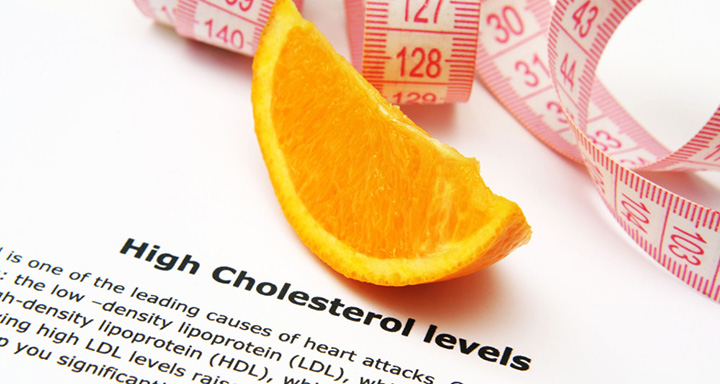Cholesterol is a fatty substance that is vital to the regulatory functions of the human body. It is found in your blood and helps in the building of healthy cells and making hormones in your body. High cholesterol in your body, however, can have an adverse impact on your heart and health in general. In the long run, this can lead to several heart diseases. This is due to deposits of fat building up in an individual’s blood vessels which in turn leads to difficulty in blood flow in the body through the arteries.
High blood cholesterol itself does not have visible symptoms, so a significant number of people with high cholesterol levels are in the dark about it. There are also several factors beyond your control that can increase your risk. They include sex, age, and heredity. However, there are factors that you can change. Examples include eating an unhealthy diet, not getting enough exercise, and being overweight. Having a high cholesterol level is very extremely dangerous for your health, but there are many ways to help you maintain it. Discussed below are the six causes of high cholesterol.

Source: Thinkstock / Jupiterimages
1. Diet
Cholesterol is present in foods that come from animal sources. Some of the most common sources include egg yolks, cheese, and meat. Some foods have high levels of fats which increase your cholesterol level. For instance, saturated fat increases your low-density lipoprotein (LDL) cholesterol more than anything in your diet. Saturated fat is present in some meats, baked goods, dairy products, chocolate, and processed and deep fried foods. Trans fatty acids push up your LDL cholesterol and lower your high-density lipoprotein (HDL) cholesterol.
Trans fatty acids form when hydrogen is added to vegetable oil to harden it. They are also present in most fried and processed foods. Limiting the intake of foods that have cholesterol, trans fatty acids, and saturated fat will go a long way in helping you to keep in check your cholesterol levels. Examples of foods that will help you include whole grains, healthy fish (containing omega-3 fatty acids), and fresh fruits and vegetables. Dropping or at least reducing the red meat in your diet is also an easy way to lower LDL cholesterol in your body.
2. Excess Weight
Lack of physical activity can easily lead to weight gain. An overweight person has a high chance of having high cholesterol. LDL is consumed too much by the majority of individuals who are obese. It is present in foods with trans fats. It is advisable to lower your HDL level and increase your total cholesterol level. The cumulative cholesterol measure is the total amount of cholesterol in your blood, which includes the LDL and HDL. It is common knowledge that routine physical exercise helps you lose weight. Hence, losing weight contributes to lower your LDL cholesterol. Additionally, physical activity can help raise your HDL cholesterol level.
3. Smoking
Who doesn’t know that smoking is bad for their health? In this case, smoking lowers the HDL cholesterol levels. This causes physical harm to the lining of the blood vessels. This process goes on and eventually only leads to one thing: blood clots. This leads to a medical case known as atherosclerosis. In simple terms, this is the hardening of the blood arteries. Second-hand smokers are not in the clear, either, in this case. Long-term exposure to the smoke can also put you at high risk for numerous other health complications. The only solution to this problem is to completely quit this practice because the revival of HDL begins after you stop. Make the right choice!

Source: pixabay.com
4. Age
Age is but just a number. Certainly not in this case, sadly. The more you age, the more likely you will have issues with high cholesterol. A good heart is certainly like a building block. It is cumulative, the earlier you make healthy lifestyle choices, the better off you will be in your senior years. Older adults tend to get lesser physical exercise in comparison to their younger counterparts. Older adults, however, can lower their cholesterol levels if they engage themselves in various activities that will help them. This includes eating healthy foods, quitting smoking and losing weight. Moreover, medical practitioners advise that by the age of 20, one should start checking their cholesterol levels every four to six years.
5. Gender
Starting at puberty, men usually have very low levels of HDL cholesterol when compared to women. As age catches up with both men and women, their LDL cholesterol levels often increase. Before the age of 55, women usually have lower LDL cholesterol level than men. However, after the age of 55, women can have higher LDL levels than men. This means that men are far much more likely to suffer from a heart attack as compared to women. Therefore, men who are at the age of 45 or more should have their cholesterol levels checked as often as possible to help reduce this risk. In the case that cholesterol is detected, it is wise to consider evaluating how you live and make serious changes to it.
6. Heredity
In some cases, eating well, having a healthy body weight, exercising regularly, and not smoking still aren’t enough to help you out. High blood cholesterol sometimes runs through the family. This means that the condition passes on from parents to children through genes. This is an inherited condition known as, hypercholesterolemia. This condition causes a very high LDL cholesterol. It begins at birth and may lead to a heart attack at a very early age. It is very wise to see a physician about one’s cholesterol status in order to know the way forward and what solutions there are in the case of this scenario.
Source: activebeat.co
Featured Image Source: myllu.llu.edu




